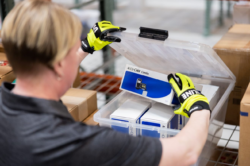MYONEX INSIGHTS
Three Key Factors to Ensure Your Ancillary Strategy Doesn’t Leave Your Clinical Trial Timelines Lagging.
Posted on 05/08/23When planning your clinical trial, what is the first item on your to-do list?
For most, sourcing clinical trial equipment would not be the first, nor anywhere near a top priority. We get it!
However, in most clinical trials, the right equipment and supplies are crucial to success. Without support from clinical trial supply services and ancillary management, last-minute planning, costly delays, and unwanted stress are imminent. Ensuring that the necessary clinical trial equipment is available and in good condition can help to prevent delays and ensure that the trial runs smoothly and efficiently.
Here’s what you need to know when planning ancillaries for your trial:
1. Plan earlier than you think.
Taking the time to make sure that you have all of the necessary equipment and supplies organized before your trial begins can help to ensure a successful outcome. Often trial teams are overwhelmed with planning, getting all the pieces of their trial in place and ancillaries are left to the last minute. Carefully collecting and organizing resources in advance will reduce stress during the trial and so you are not left scrambling by the time the trial starts. During the protocol process, start reaching out to partners who can assist with supplying those ancillary products, even if you aren’t sure what they are yet.
2. Keep location and regulations in mind.

When planning, it is important to not only make sure the supplies fit within your budget but also that they meet the needs and regulations required for your trial sites. Not all sites are the same, and some smaller sites may require basic medical supplies such as gauze and tape in addition to the more specialized equipment you need for the trial. If you are conducting a trial throughout multiple countries, there are additional regulations and factors you must check in on. Something as simple as improper prongs for outlets could keep your trial behind if you ordered from another country and have no backups. Knowing which supplies you need and how much of each item you need can help ensure that your trial runs smoothly and efficiently.
3. Ask for guidance.
Delaying your trial due to missed ancillary supplies is simply not an option. By working with an experienced partner who can help you anticipate your needs and plan ahead, you can avoid costly delays and keep your study on track. Look for guidance when working with suppliers and ask them what they think would work best for your trial type. Many vendors may have supplied similar equipment for a trial and can advise what option will work best. Also, suppliers will ask questions you may not have considered. For example, in the scenario where the prongs do not match the socket, suppliers would have called that out in the beginning when ordering.
It is important to plan and consider all the equipment and supplies that you need when conducting a clinical trial early in the process. Different types of trials and site locations will require different pieces of equipment and supplies, so make sure to consult with your team or experts in the field to identify exactly what is needed. Having all the necessary materials ensures that your trial will go smoothly, without any delays or issues.
When looking for a vendor to help with your equipment needs, look no further than Myonex. With over 30 years of clinical supply experience and an experienced team, we can help guide your ancillary supply decisions to work best for your trial. Clinical trial equipment and supplies experts at Myonex are ready to get started with your plans. Contact us today.

